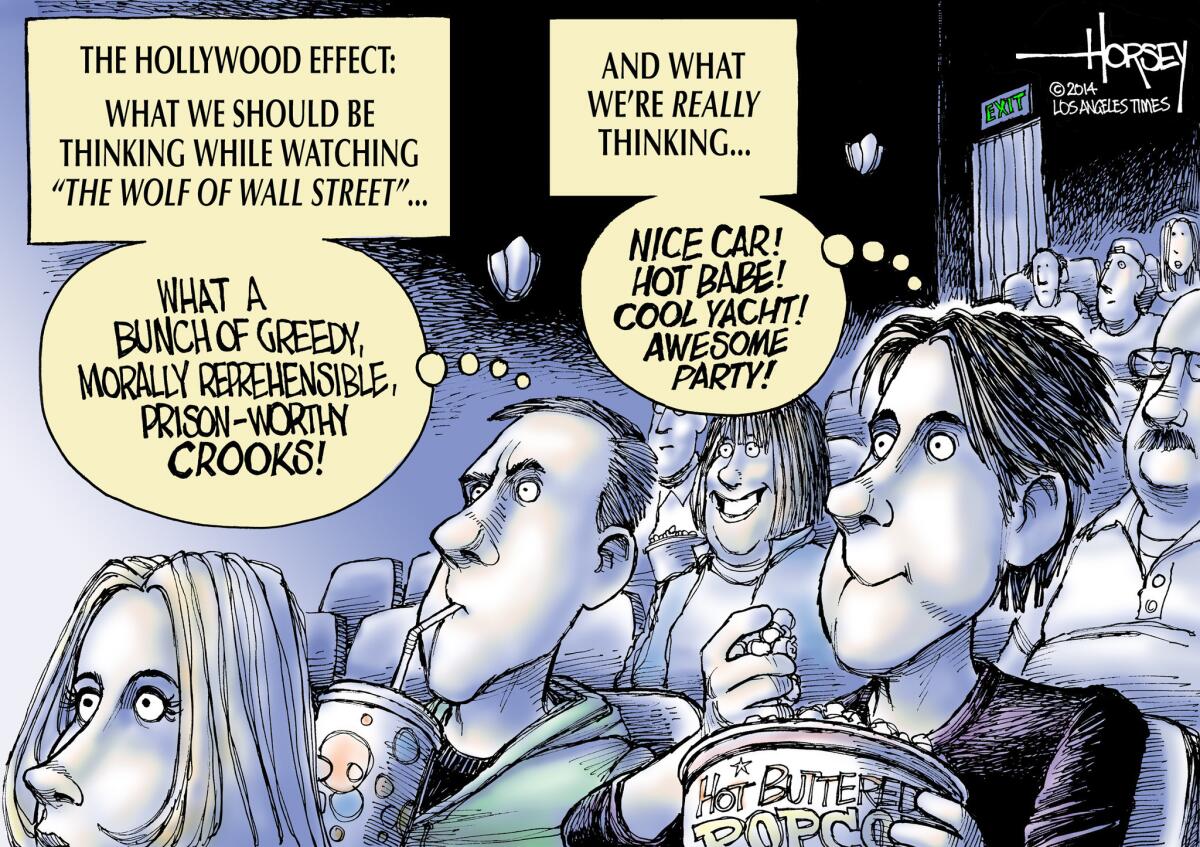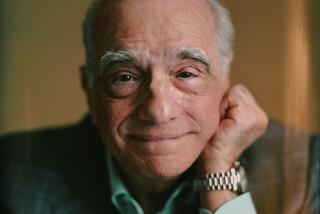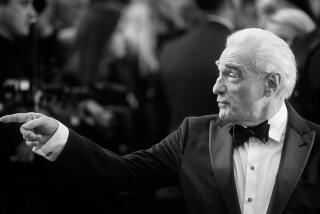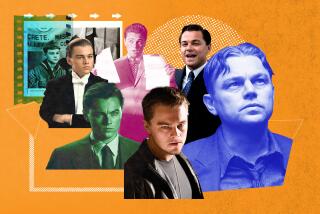America wolfs down ‘Wolf of Wall Street’ excess

- Share via
Martin Scorsese and Leonardo DiCaprio are being accused of glamorizing a criminal in their new movie, “The Wolf of Wall Street” – a charge to which generations of actors and filmmakers could plead guilty.
The criticisms began with an open letter to the film’s director and leading man from Christina McDowell, the daughter of Tom Prousalis, an accomplice to Jordan Belfort, the con-man portrayed by DiCaprio in the movie. Belfort bilked millions of dollars from investors before getting caught, spending a short stint in prison and hitting it big with the memoir on which “The Wolf of Wall Street” is based.
“You people are dangerous,” McDowell wrote to DiCaprio and Scorsese. “Your film is a reckless attempt at continuing to pretend that these sorts of schemes are entertaining, even as the country is reeling from yet another round of Wall Street scandals.… Did you think about the cultural message you’d be sending when you decided to make this film? You have successfully aligned yourself with an accomplished criminal, a guy who still hasn’t made full restitution to his victims, exacerbating our national obsession with wealth and status and glorifying greed and psychopathic behavior.”
Others chimed in online. Hillary Crosley on the website Jezebel said she regretted seeing the movie “and increasing the bank account of a known criminal and huckster.”
At the Huffington Post, Ernest Owens urged working-class families to avoid the film. “The man that many moviegoers might accidentally root for in theaters this holiday season was the same man that defrauded a lot of working-class people out of tons of money,” he said.
Hollywood has never shied away from the public’s fascination with bad guys. From Warren Beatty and Faye Dunaway in “Bonnie and Clyde” to Robert Redford and Paul Newman in “Butch Cassidy and the Sundance Kid” to Johnny Depp in “Public Enemies,” accomplished and attractive actors have been hired to play real-life criminals in sympathetic ways on the big screen.
In the era governed by the Motion Picture Production Code, hoodlums portrayed by stars such as James Cagney and Edward G. Robinson always paid for their bad deeds in the end. Bad guys were required to look bad. Today, in successful television series such as “Boardwalk Empire” or “Breaking Bad,” the criminals are presented with such psychological depth – and the lawmen are caricatured as so crooked themselves – that it is hard not to root for them.
ON LOCATION: Where the cameras roll
Has Scorsese taken this phenomenon too far? Is DiCaprio’s version of Belfort too charming, too glib, too likeable? Are Belfort’s crimes made to look too benign and his lavish lifestyle too appealing? Does it make a difference that Belfort, the real-life bad guy, has gained substantial benefit from the making of the movie?
Scorsese is a great director who has illuminated the lives of criminal figures in several fine films, including “Goodfellas,” “The Departed” and “Gangs of New York.” At a time when Wall Street crooks have repeatedly ravaged the U.S. economy, does his illumination of economic crime make it look like too much over-the-top fun?
In his own defense, Scorsese has said, “This is something that’s not going to go away if you don’t talk about it.”
And, when crime is talked about in the language of movies -- compelling images, handsome actors and smart dialogue -- it seems inevitable that crooks are going to look far more glamorous and engaging than they are in real life.
ALSO:
Duck Dynasty flap makes reality too real
Horsey on Hollywood: The 2013 Year in Review
Horsey on Hollywood: Gunplay in PG-13 movies
More to Read
From the Oscars to the Emmys.
Get the Envelope newsletter for exclusive awards season coverage, behind-the-scenes stories from the Envelope podcast and columnist Glenn Whipp’s must-read analysis.
You may occasionally receive promotional content from the Los Angeles Times.











